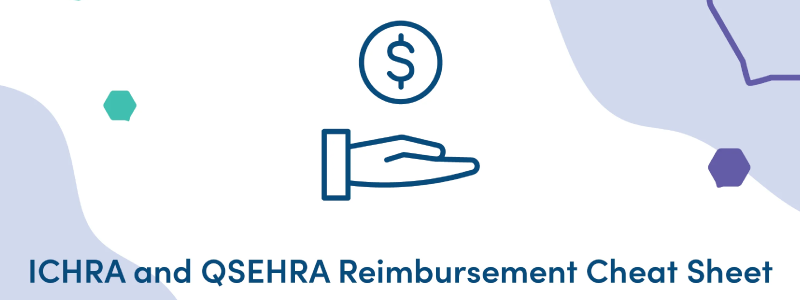A Health reimbursement arrangement (HRA) is a employee benefit growing in popularity that can be used to reimburse employees for individual health insurance premiums and eligible medical expenses. Though Individual Coverage HRAs (ICHRA) and Qualified Small Employer HRAs (QSEHRA) are both tools that can be used to reimburse employees for insurance premiums and medical expenses they each have their own unique parameters that will dictate which plan is best for each employer.
Below is a cheat sheet and explanation covering the following topics related to reimbursement:
- Reimbursement Requirements for QSEHRA and ICHRA
- Qualified medical expenses that can be reimbursed
- Taxability questions
Download the FREE Reimbursement Cheat Sheet
A QSEHRA will provide more flexibility to employees in how they can use their reimbursement. These plans allow for premium reimbursement towards Major Medical insurance plans from the marketplace, some group health insurance plans, government plans, or towards alternative solutions like short term medical or sharing ministry plans if they are paired with Minimum Essential Coverage (MEC).
To collect reimbursement from an ICHRA, employees must have coverage under an individual health insurance policy or Medicare. The key to unlocking reimbursement from either plan is proof of required coverage. To substantiate coverage employees can provide a copy of their health insurance card or a medical receipt proving the coverage qualifies based on the IRS guidance.
What medical expenses are reimbursable?
While ICHRA and QSEHRA plans are required to reimburse premiums, an employer can choose to include or exclude reimbursable medical expenses. Two things must be in place before an employee can claim medical expense reimbursements:
- The employer must have elected to allow medical expense reimbursement in the HRA plan terms;
- The employee must meet the insurance enrollment requirements listed above.
Employers determine what medical expenses to cover, this list can include all IRS eligible expenses outlined in Publication 502 or a specific list of hand selected expenses from the IRS allowable list.
How will reimbursements be taxed?
ICHRA reimbursements will always be tax-free. In most cases, QSERHA reimbursements will be tax-free to employees and provide a tax deduction for employers. However, there are some circumstances that may require taxable reimbursements.
Note: The advice in this cheat sheet should not be construed as official tax advice. We are licensed and experienced advisors, but we cannot model every scenario.
How Benafica can help.
Benafica offers employers and their employees full service HRA administration. Complimentary consulting services explain the different options to employers so each company can tailor their HRA plan to their own budget and employee benefit goals. On the employee side, each employee receives their own Benafica account to manage their HRA dollars and reimbursements.
Let Benafica help your company. Contact us today!

